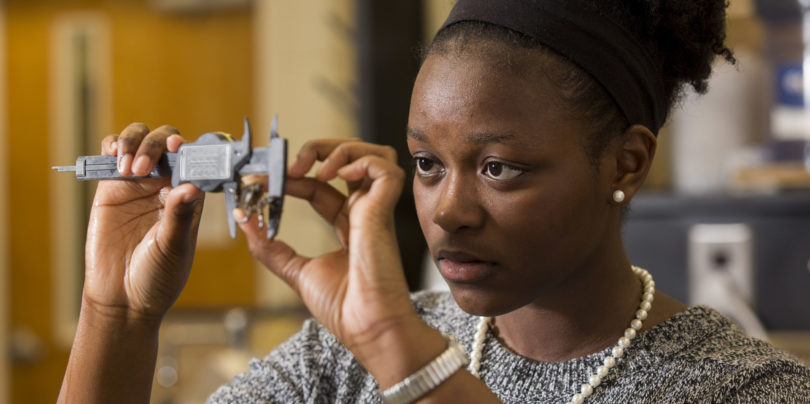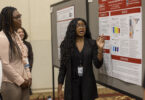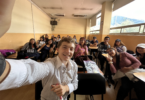Sydney-Alyce Bourget stands at the edge of Harvard Forest, measuring the height of one of the 25 garlic mustard plants she’s been studying. Emil Dmello sorts through election data, looking at economic indicators like unemployment, inflation, the misery index and the GDP and searching for their connection to election outcomes. Zack Flagel scrolls through the spreadsheet on his computer, checking baseball stats not many people know by heart: the number of spectators injured by foul balls at Major League Baseball games. McKenna Barney now easily spots trends in case studies on maternal malnutrition in conflict zones: Hunger and conflict go hand in hand, and food is often used as a weapon.
These four University of Georgia students are among 554 undergraduates who presented their research at the annual CURO Symposium. They spent hours, semesters, years working with faculty mentors as they study topics that interest them.
Hosted by the Center for Undergraduate Research Opportunities, the Symposium is a chance for students to “tell the world about our research,” Bourget said. Held this year on April 3-4 at the Classic Center in downtown Athens, the event included students in 91 majors and 13 colleges and schools, and involves 311 faculty mentors from 73 UGA departments.
Over the past several years, Symposium organizers have seen a sharp increase in the number of students participating. CURO, administered by the Honors Program, was expanded to non-Honors students in 2010, a year when about 200 undergraduates took part in the event. In 2014, participation broke 250 and has been skyrocketing ever since.
“It has been a great pleasure to observe the growth of undergraduate research across the UGA campus in recent years,” said David S. Williams, associate provost and director of the Honors Program. “This growth is the result of both student interest and faculty support. To be able to offer students up to a full four years of faculty-mentored research in any field of study is truly amazing.”
Much of the growth is due to a $1,000 research stipend the university launched in 2014 as part of a series of academic enhancements. Known as the CURO Research Assistantship, the program now awards 500 stipends annually.
“The success of the CURO Research Assistantship has resulted in dramatic growth in participation for the CURO Symposium,” said Martin Rogers, associate director of the Honors Program and CURO. “The wide distribution of majors, faculty departments and subject matter we see in our Symposium program reflects the expansive impact of that initiative.”
At the heart of the numbers are students like CURO Honors Scholar Sydney-Alyce Bourget from Jonesboro, a third-year ecology major in the Odum School of Ecology who studies with professor Jeb Byers. She is fascinated by invasive plants. This summer, she’ll analyze cordgrass impact on the Georgia coast. Last summer, she was more likely to wear a sweatshirt in the field — she spent 11 weeks in Massachusetts studying garlic mustard’s threat to Northeastern woodlands as a research intern in Harvard University’s forest. She is presenting her garlic mustard research at the Symposium.
“I really enjoyed working there,” she said. “It was my first time doing fieldwork. By doing research, I learn about the subject I’m researching, and it also allows me to be a part of a network, a community in the lab I’m in. Research has allowed me to be more confident in myself and confident in my ability to learn.
“I’ve always had the desire to learn and investigate things, and UGA definitely solidified my passion for doing research and for learning. That’s what I love about research — the desire to learn and to find out and understand what’s happening in the world.”
 At top, Sydney-Alyce Bourget is investigating invasive plants through her CURO project. Above, Emil Dmello has focused his research on how economic factors influence elections. (Andrew Davis Tucker/UGA, Peter Frey/UGA)
At top, Sydney-Alyce Bourget is investigating invasive plants through her CURO project. Above, Emil Dmello has focused his research on how economic factors influence elections. (Andrew Davis Tucker/UGA, Peter Frey/UGA)
Emil Dmello, a senior from Sandy Springs majoring in management information systems in the Terry College of Business — with minors in computer science and political science — put his 2016 and 2017 CURO Research Assistantships to good use, particularly this year as he worked with faculty member Nikhil Srinivasan on how economic factors influence election outcomes.
“My research is looking at this concept of economic predestination,” said Dmello, who will be presenting for his second time at the Symposium. “There’s one school of thought that believes simple economic metrics and the incumbent party in the presidency is all that is required in predicting election results. Historians tend to side with this school of thought, but political scientists tend to side with the opposing research, saying that endorsements, debates, ground game, everything like that, is going to impact the results and how people vote.
“Everyone is affected by the government, all the way from the DMV to the elections. I really hope, by presenting, that I can get more people involved. It’s important for the electorate to be politically savvy.”
The CURO Symposium is coming at the perfect time for Zack Flagel from Marietta, a third-year economics major in Terry College who has been studying abroad at the London School of Economics since September. He’ll be back in Athens during his spring break and presenting research on a legal analysis of spectator injury risk at Major League Baseball games. It’s a project he’s been working on since his freshman year when he serendipitously met associate professor Nathaniel Grow.
“I want to go into sports law, and Terry offers several legal introductory classes, one of which my year was taught by professor Grow,” said Flagel, who grew up playing baseball. “I’ve always been interested in a career in sports, particularly baseball, and he was researching exactly what I want to go into as a career.
“Doing legal research as an undergrad, especially before legal training, is difficult and unheard of. The structured system for undergraduate research at UGA has made it easier. Professor Grow has been an awesome mentor, and I appreciate all the help he’s given me.”
 McKenna Barney’s CURO research involves studying the factors that lead to malnutrition of mothers in conflict zones. (Dorothy Kozlowski/UGA)
McKenna Barney’s CURO research involves studying the factors that lead to malnutrition of mothers in conflict zones. (Dorothy Kozlowski/UGA)
McKenna Barney, a freshman from Pittsburgh, Pennsylvania, majoring in geography and economics in the Franklin College of Arts and Sciences and Terry College, worked with associate professor Maria Navarro in the College of Agricultural and Environmental Sciences. Her project focused on mothers in conflict zones — particularly Chiapas, Mexico; Somalia; and Iraq — and factors that lead to their malnutrition.
“The biggest trend I’ve seen is the cyclical nature of how hunger can cause conflict through violence instigated by spikes in food prices or the failure of a government to respond to a natural disaster that interferes with agricultural production,” she said. “But, also, conflict causes hunger through degradation of fields through combat or refugees trampling crops or land mines destroying agriculture. All these are side effects and unintended consequences of conflict that we don’t normally consider.
“I also looked at food as a weapon, which is often a problem. It’s an easy way to hurt a certain population, and women are one of the most vulnerable groups.”
Bourget, Dmello, Flagel and Barney are among the 224 presentations and 290 posters included in the Symposium. The two-day event opened April 3 with presentations. Michael Terns, Distinguished Research Professor in the Franklin College’s biochemistry and molecular biology department, delivered the keynote address on “CRISPR: From Basic Biology to Genome Editing Revolution.” A poster session and reception followed.
Oral presentations continued April 4.
The annual CURO Symposium is sponsored by the Office of the President, the Office of the Senior Vice President for Academic Affairs and Provost, the Office of Instruction, the Office of Research, the UGA Libraries and the Honors Program.
A UGA bus marked “Special” will provide transportation to the Classic Center, with stops at the Georgia Center for Continuing Education, Tate Student Center and the Arch.
As well as its annual Symposium, CURO offers coursework, support staff and information sessions on how to begin conducting research. In addition to $3,000 summer fellowship grants, students can apply for the CURO Research Assistantship, which provides $1,000 stipends to 500 undergraduates each year. Research through CURO fulfills the university’s newly implemented experiential learning requirement.
For more information, visit curo.uga.edu/symposium.








